Classic Commentaries and Studies on Ecclesiastes (26 vols.)
Digital Logos Edition
Overview
The Classic Commentaries and Studies on the Book of Ecclesiastes (26 vols.) offers some of the most significant classical studies on the book of Ecclesiastes from the nineteenth and twentieth centuries. With notable authors such as Charles Bridges, Richard G. Moulton, and James Strong, Classic Commentaries and Studies on the Book of Ecclesiastes (26 vols.) contains over 7,000 pages of interpretation, observations, translations, contextual history, and practical application. The twenty-six volumes contained in the Classic Commentaries and Studies on the Book of Ecclesiastes (26 vols.) have had an enduring impact on Old Testament exegesis, and this exceptional collection provides easy access to this wealth of significant scholarship.
This collection is essential for students, scholars, pastors, historians, teachers of the Bible, or anyone studying the book of Ecclesiastes. With Logos Bible Software, this collection is completely searchable, with passages of Scripture appearing on mouse-over, as well as being linked to the Greek and Latin texts and English translations in your library. This makes these texts more powerful and easier to access than ever before for scholarly work or personal Bible study. With the advanced search features of Logos Bible Software, you can perform powerful searches by topic or Scripture reference—finding, for example, every mention of “folly” or “Ecclesiastes 5:1.”

- Over 7,000 pages of notable scholarship on the book of Ecclesiastes
- Noted authors from a variety of backgrounds
- Completely searchable, linked to your preferred Bible translation and the other books in your library
- Title: Classic Commentaries and Studies on Ecclesiastes (26 vols.)
- Volumes: 26
- Pages: 7,628
- An Exposition of the Book of Ecclesiastes by Charles Bridges
- The Book of Ecclesiastes: Its Meaning and Its Lessons by Robert Buchanan
- The Royal Preacher: Lectures on Ecclesiastes by James Hamilton
- Ecclesiastes: A New Translation with Notes Explanatory, Illustrative, and Critical by John Noble Coleman
- Coheleth, Commonly Called the Book of Ecclesiastes by Christian D. Ginsburg
- Commentary on Ecclesiastes E. W. Hengstenberg
- An Attempt to Illustrate the Book of Ecclesiastes by George Holden
- An Analysis of the Book of Ecclesiastes by J. Lloyd
- The Book of Ecclesiastes Explained by James M. Macdonald
- The Book of Solomon, Ecclesiastes, or, The Preacher: Metrically Paraphrased and Accompanied with an Analysis of the Argument by Aaron Augustus Morgan
- Ecclesiastes: Lessons for the Christian's Daily Walk by G. W. Mylne
- A Brief Exposition with Practical Observations upon the Whole Book of Ecclesiastes by John Cotton
- The Hebrew Text, and Latin Version, of the Book of Solomon, Called Ecclesiastes by Theodore Preston
- A Commentary on the Book of Ecclesiastes by Eduard Reynolds
- Commentary on Ecclesiastes by Moses Stuart
- Ecclesiastes: A Contribution to Its Interpretation by Thomas Tyler
- Lectures on the Book of Ecclesiastes, vol. 1 by Ralph Wardlaw
- Lectures on the Book of Ecclesiastes, vol. 2 by Ralph Wardlaw
- New Translation of the Book of Ecclesiastes with Critical Notes on the Hebrew Text by Benjamin Weiss
- A Commentary on the Book of Ecclesiastes by Loyal Young
- The Portrait of Old Age: A Paraphrase upon the Six Former Verses of the XIIth Chapter of Ecclesiastes by John Smith
- Ecclesiastes and the Wisdom of Solomon by Richard G. Moulton
- Ecclesiastes or The Confessions of an Adventurous Soul by Minos Devine
- A Gentle Cynic: Being a Translation of the Book of Koheleth by Morris Jastrow
- The Meditations and Maxims of Koheleth by T. Campbell Finlayson
- A Complete Hermeneutical Manual on the Book of Ecclesiastes by James Strong
This title is included in the following collections
You can save when you purchase this product as part of a collection.
2025 Platinum Library
$1,499.99$1,199.99Biblioteca Platinum Bilingual ...
$1,629.99$1,222.492025 이중언어 플래티넘 서재
$2,149.99$1,719.992025 繁體中英雙語白金版圖書資料庫
$2,399.99$1,919.99
- $2,399.99$1,919.99
- $2,999.99$2,249.99
- $3,399.99$2,549.99
- $3,899.99$2,924.99
- $3,899.99$2,924.99
- $4,149.99$3,112.49
- $4,739.99$3,554.99
- $4,749.99$3,562.49
- $5,999.99$4,499.99
- $5,999.99$4,499.99
- $6,399.99$4,799.99
- $10,999.99$8,249.99
- $11,399.99
- $11,399.99
- $23,999.99$17,999.99
- $21,749.99
- $24,999.99
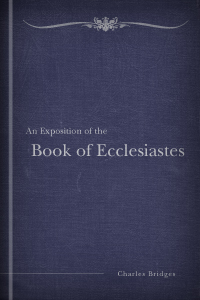
Offering an extensive commentary on the book of Ecclesiastes, Charles Bridges discusses authorship, transcription and transposition of the text, the inherent theopneustic nature, and the scope and focus of the text. Bridges provides critical notes for explanation of semantics, further reading, and doctrinal clarification. Bridges concludes that the text is undoubtedly the product of divine inspiration.
Mr. Bridges is the author of several well-known and highly esteemed practical works. This volume is of the same general character. The author is indeed a scholar . . . he is conversant with the discussions of authorship, authority, and exposition of the Book of Ecclesiastes.
—The Biblical Repertory and Princeton Review
Charles Bridges (1794-1869) was an English preacher and biblical scholar, and is perhaps best-known for his theological writings.
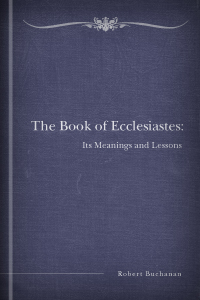
Exegetically moving through the book of Ecclesiastes, Robert Buchanan examines the authorship, composition, literary devices, canonicity, and scope of the text. Originally delivered in as a series of sermons, this collection of nineteen sermons walks expositionally chapter-by-chapter through the text.
To an expositor of scholarly habits, exegetical skill, and given to historical criticism, the Book of Ecclesiastes presents a noble field for the exercise of all these accomplishments. The style is pointed and clear; treasures of varied information are brought to the illustration of the text; while the mode in which the principles of Christian morality are brought out in it, is such as to warrant the belief that it will be extensively useful.
—The North British Review
Robert Buchanan (1802–1875) was educated at the University of Glasgow before becoming Minister of Garunnock. Buchanan went on to pastor several churches in Scotland including the Tron Church in Glasgow and the church in Salton, Haddingtonshire.
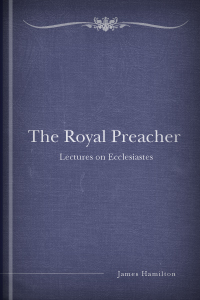
Comparing the translations from the Latin Vulgate and the Biblia Hebraica Stuttgartensia among other renderings, James Hamilton states that the inherent meaning of the text is corrupted depending on the subjectivity of each translator. Conveying that Solomon "becomes a poet, logician, a satirist, or a penitent, according to the mood of his interpreter," Hamilton seeks to expound the intended meaning of the key themes found in Ecclesiastes.
The style is animated and generally chaste, and the spirit of the work is excellent.
—Methodist Review

James Hamilton (1814–1871) was born in Paisley, Scotland and was pastor of the National Scotch Church, Regent Square London. He served as the editor for Presbyterian Messenger and Evangelical Christendom, and authored numerous popular books, including Life in Earnest, The Mount of Olives, The Royal Preacher, and the four-volume Our Christian Classics.
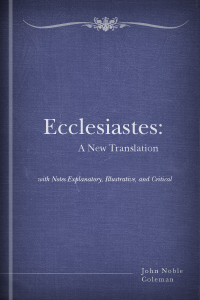
Expounding on the theopneustic nature of the text, John Noble Coleman exegetically examines the authorship, teachings, doctrines, and composition of Ecclesiastes. Emphasizing the condemnation of idolatry, Coleman provides concise studies on the text. The author draws upon the Septuagint, Peshitta, Chaldee Targum, Latin Vulgate, and the Biblia Hebraica Stuttgartensia for semantic comparison.
The notes which follow are simply explanatory and illustrative, designed to elucidate the obscurities of this ancient didactic poem, and to render both its diction and allusions clear, perspicuous, and intelligible to the English reader. Excellent as our English translation, and conveying, as it does . . . the sense and spirit of the original [text], with uncommon simplicity, force, and beauty of expression.
—The British and Foreign Evangelical Review
John Noble Coleman was a nineteenth century Bible scholar educated at Queen's College, Oxford. Coleman was the late incumbent of Ventnor, England.
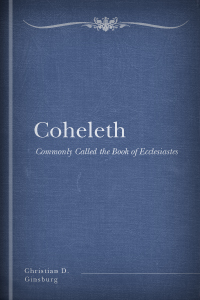
Providing thorough exegesis on the book of Ecclesiastes, Christian D. Ginsburg examines the significance of the canonicity assigned to the text. Claiming Solomonic authorship, Ginsburg moves expositionally through the text while providing compelling commentary on authorship, semantics, intended doctrines, and composition.
It is but justice, however, both to the writer and to the public, to call attention to one of the best Commentaries on an Old Testament book, which the modern English press has produced . . . so far as we know, it is the best book on the subject in the language.
—The London Review
Christian D. Ginsburg (1831–1914) was born to a Jewish family and converted to Christianity at the age of fifteen. He is best known for his two scholarly Hebrew works, the Masorah (in three volumes) and the Massoretic-critical Edition of the Hebrew Bible.
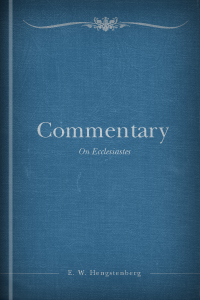
Focusing on misery derived from earthly pursuits, E. W. Hengstenberg moves verse-by-verse while offering comprehensive exegesis of the text. Viewing Ecclesiastes as an exhortation from the author, Hengstenberg examines semantic and implicit meaning throughout the book with regard for historical context. The author draws upon acclaimed authors such as Franz Delitzsch and Ferdinand Hitzig to clarify key points and arguments.
. . . worthy of the careful attention of biblical students. He is one of the greatest and most reliable among the evangelical writers of modern Germany.
—The United Presbyterian Review
E. W. Hengstenberg (1802–1869) was educated at the University of Bonn before becoming Professor of Theological Philosophy at the University of Berlin. In 1827 Hengstenberg became the editor of Evangelische Kirckenzeitung, a German Journal intent on defending the Christian faith.
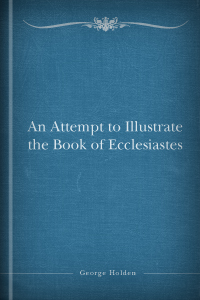
Discoursing on the authorship, composition, style, and scope of Ecclesiastes, George Holden's An Attempt to Illustrate the Book of Ecclesiastes offers succinct analysis of the essential parts within the text. Stating that the text is difficult to interpret without historical and cultural context, Holden provides exposition of the text that expands upon or denounces previous commentators. The author provides explanatory notes for clarification of semantic expression, omission and transcription variations, and various interpretations of the text.
The work is further accompanied by useful notes, establishing the scope and design of the Book of Ecclesiastes, and embodying such observations as seem proper to enforce and elucidate the whole [text]. We are indebted to Mr. Holden's labors for the excellent view of the scope and synopsis of the Book of Ecclesiastes.
—An Introduction to the Critical Study and Knowledge of the Holy Scriptures
George Holden is a nineteenth century scholar. Holden is also the author of The Bible Class and Family Expositor, The Christian Sabbath, and The Authority of Tradition in Matters of Religion..
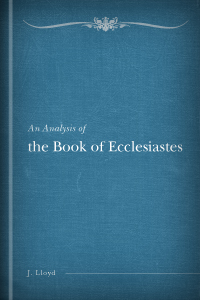
Viewing the text of Ecclesiastes as one of the earliest examples of pragmatic "moral philosophy," J. Lloyd offers a brief commentary that provides exegesis of the text with emphasis on semantic and rhetorical expression. Lloyd refers to several well known authors such as Frederich W. Gesenius, Heinrich Ewald, and Moses Stuart to validate his assertions.
There are many commentaries, but we are aware of none in which the plan of Mr. Lloyd is adopted, giving special attention to the grammatical construction of the text . . . explain[ing] the meaning of the original, that word he has supplied furnishing, at the same time, some authority for his adoption of every new word, phrase, or sentence.
—Bookseller: The Organ of the Book Trade
J. Lloyd was a Fellow of Cambridge and Rector of Llanvapley, Monmouthshire.
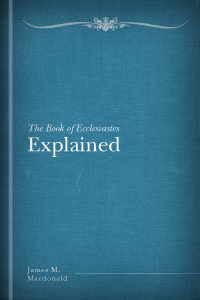
In The Book of Ecclesiastes Explained, James M. Macdonald presents comprehensive commentary that focuses on exegesis of the text with regard for literary criticism. Macdonald evaluates the etymology and translation of the text.
We are very much pleased with this commentary as a whole. Dr. Macdonald has a clear theory of the book . . . there is much excellent sense in Dr. Macdonald's expositions, and the while may be considered sound and judicious.
—The Presbyterian Quarterly Review
James M. Macdonald (1812–1876) was Minister of the First Presbyterian Church, Princeton.
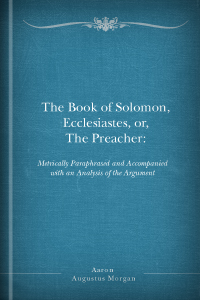
Arranged as a series of twenty-two lectures, Aaron Augustus Morgan offers a concise commentary focused on the depravity of vanity, earthly pursuits, and human nature. Seeking to distill the ramifications of vanity, Morgan combines doctrines found in the text with practical application.
It deserves credit, indeed, for its evangelical vindication of the Canticles, as being an utterance of the deep things of God: the ingenuity with which the entire Scriptures are developed from, or rather inlaid into.
—The London Quarterly and Holborn Review
Aaron Augustus Morgan was educated at St. John's College, Cambridge before becoming Vicar of Brighton. Morgan later went on to become Rector of Bradley, Lincolnshire.
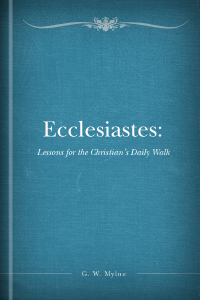
G. W. Mylne's Ecclesiastes: Lessons for the Christian's Daily Walk explores the principles found in the book of Ecclesiastes. Written with practical application in mind, this volume moves expositionally verse-by-verse in order to provide comprehensive understanding of the intent held within the text.
The tone is healthy, the inferences are plain, and eminently practical.
—Educational Review
A work of great practical value.
—Christian Lady's Magazine
G. W. Mylne is also the author of Intercessory Prayer, Fear Not, The Mighty Mystery, and The Spirit of Life in the Soul.
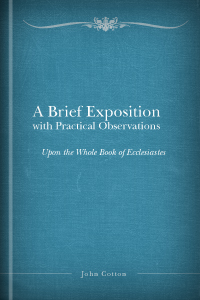
Discoursing on the book of Ecclesiastes, John Cotton examines the inherent meaning of the text. Focusing on interpreting figurative language and conveying intended meaning, Cotton disseminates the literary qualities of the text within historical context and interpretation. Using semantics as a tool for further clarification, the author provides elucidation for critical pieces of the text.
John Cotton was a nineteenth century theologian and minister of Boston. Cotton is the author of several titles including The Keyes to the Kingdom of Heaven and The Bloody Tenent of Persecution for Cause of Conscience.
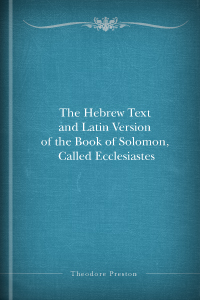
Providing translation of Ecclesiastes from the Hebrew, Latin, and English texts, Theodore Preston offers detailed semantic clarification on the Book of Ecclesiastes. Outlining cases of varying meaning, omission, and transposition differences, Preston asserts the intended meaning of the text.
The preliminary discourse contains a candid and critical estimate of the merits and demerits of preceding commentators . . .We regard Mr. Preston's beautifully printed volume as a most valuable contribution and help to the study of the Hebrew Scriptures.
Introduction to the Critical Study and Knowledge of the Holy Scriptures
Theodore Preston was a nineteen century theologian. Preston is also the author of Phraseological notes to the Hebrew text of the Book of Genesis and Catalogus bibliothecae Burckhardtianae.
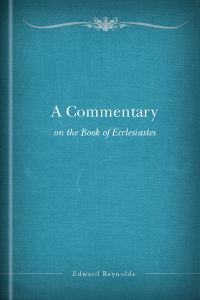
Exegetical in nature, Edward Reynolds' A Commentary on the Book of Ecclesiastes critically examines the Book of Ecclesiastes—while emphasizing the instability of morality within vanity. Making a case for Solomonic authorship, Reynolds offers exegesis that elucidates the contextualized intent of the text.
Edward Reynolds (1599–1676) was Bishop of Norwich and Vice-Chancellor of the University of Oxford.
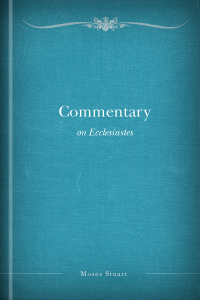
Moving expositionally chapter-by-chapter, Moses Stuart provides compelling exegesis on historical context, authorship, scope of the text, and its relationship to the Law within the application of practical moral philosophy. Stuart illustrates the key themes in the text with regards to the gnomological aspect of the book of Ecclesiastes.
Professor Stuart's commentary on Ecclesiastes has been well-known to the public for several years . . the students of the Bible in our country owe a debt of gratitude to Professor Stuart for his services, which can scarcely be measured.
—New Englander and Yale Review
Moses Stuart (1780–1852) was an American Bible Scholar, born in Connecticut. He was also a pastor and professor at Andover Theological Seminary. Called the “father of exegetical studies”, Stuart also trained over 100 missionaries. In addition to this commentary, Stuart also wrote Conscience and the Constitution, Commentary on the Epistle to the Hebrews, Commentary on the Epistle to the Romans, and Winer’s Greek Grammar of the New Testament.
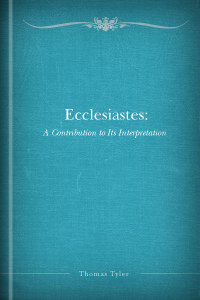
Covering in detail the character, authorship, doctrines, and style of the text, Thomas Tyler provides succinct exposition of Ecclesiastes. Attempting to distinguish between esoteric and exoteric doctrines in the text, Tyler states that the book of Ecclesiastes takes a philosophical rather than an imperative stance—regardless of divine inspiration.
His introduction takes up all questions bearing on the authorship, character, and design of the book; his exegetical analysis is, on his own ground, an admirable example of luminous exegesis and his translation, is, together with its notes, the fruit of ripe and accurate scholarship, and will prove valuable aid to those who desire to bestow a careful and critical examination on the Book of Ecclesiastes.
—The British Quarterly Review
Thomas Tyler was prizeman in Hebrew and New Testament Greek at the University of London. Tyler is also the author of Jehovah the Redeemer God and The Herbert-Fitton Theory of Shakespeare's Sonnets.
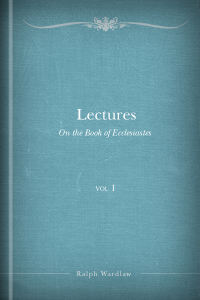
Originally delivered as a series of lectures from the pulpit in 1810–1811, Ralph Wardlaw offers detailed exposition of the text with regard for composition of the text, characterization of the text's author, and scope of the text. Seeking to disseminate the vital themes and applications found in the text, volume one contains twelve lectures that move expositionally verse-by-verse.
This is a very elegant commentary on an exceedingly difficult portion of Scripture.
—An Introduction to the Critical Study and Knowledge of the Holy Scriptures
Ralph Wardlaw (1779–1853) studied theology at the University of Glasgow before being ordained in 1803. Wardlaw first pastored at the chapel in Albion, Glasgow before later moving to pastor the West George Street chapel in Glasgow. He is also the author of Lectures on the Epistles to the Romans, 3 vols..
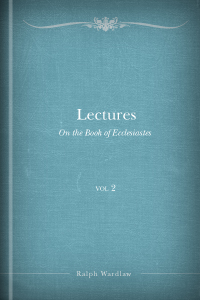
Originally delivered as a series of lectures from the pulpit in 1810–1811, Ralph Wardlaw offers detailed exposition of the text with regard for composition of the text, characterization of the text's author, and scope of the text. Seeking to disseminate the vital themes and applications found in the text, volume two contains twelve additional lectures that move expositionally verse-by-verse.
This is a very elegant commentary on an exceedingly difficult portion of Scripture.
—An Introduction to the Critical Study and Knowledge of the Holy Scriptures
Ralph Wardlaw (1779–1853) studied theology at the University of Glasgow before being ordained in 1803. Wardlaw first pastored at the chapel in Albion, Glasgow before later moving to pastor the West George Street chapel in Glasgow. He is also the author of Lectures on the Epistles to the Romans, 3 vols..
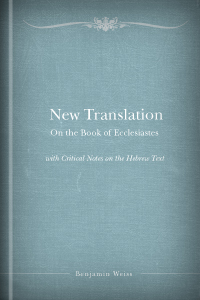
Providing detailed exposition on the book of Ecclesiastes, Benjamin Weiss compares the text within historical and semantic context. Stating that the book is the result of experimental wisdom supplemented with divine guidance, Weiss brings forth detailed explanation and annotation of the text.
We have not yet met with any commentary on the same book which we consider as, on the whole, superior. he has happily reflected the light of the Gospel on some of its dark places. Many of his illustrations are ingenious, if not beautiful.
—The United Presbyterian Review
Benjamin Weiss was Pastor of a Presbyterian Church in Butler, PA. Weiss is the author of numerous works, including New Translation and Exposition of the Book of Ecclesiastes and A Christian Jew on the Old Testament Scriptures.
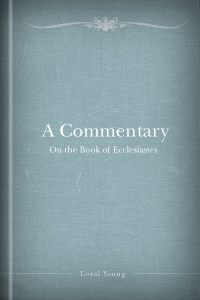
Warning against a hedonistic lifestyle, Loyal Young examines the scope, doctrines, authorship, and interpretation of the text. Moving verse-by-verse through the book of Ecclesiastes, Young extends clarification on figurative language, semantics, and characterization of the author.
It is rich in scriptural thought and illustration, and will furnish valuable aid to the preacher, as well as to the private student of the Word of God. The volume is beautiful, clear, attractive . . . making it most pleasant to read.
—The Congregational Review
Loyal Young was Pastor of the Presbyterian Church in Butler, PA.
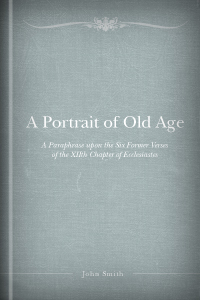
Focusing on the first six verses of Ecclesiastes 12, John Smith offers concise commentary on the embodiment of the key theme found within the text. Asserting that the crux of Ecclesiastes lay in this selection, Smith calls for the exemplification of remembrance.
John Smith was a seventeenth century historian.
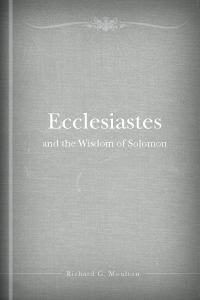
Studying Ecclesiastes and the Wisdom of Solomon simultaneously, Richard G. Moulton compares authorship, literary structure, composition, and semantics. Viewing the texts within a gnomological framework, Moulton provides detailed exegesis that incorporates historical context. Stating that the Wisdom of Solomon was once canonized, the author structures his commentary to elucidate the intended themes within the text.
This suggestive little book cannot be perused without interest and profit. An appreciation of the two writings with which it deals, it is simply admirable the aim of the editor . . . has been rarely well achieved.
—The Presbyterian Review
Richard G. Moulton (1849–1924) was Professor of English Literature at the University of Chicago.
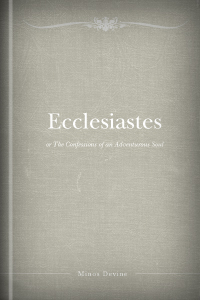
Published for student and layman alike, Minos Devine's Ecclesiastes or The Confessions of an Adventurous Soul provides comprehensive studies on the text with regard for historical context. Devine provides critical notes for clarification on doctrine, further reading, and semantic clarification.
Minos Devine (1871–1937) was educated at Worcester College, Oxford. He is the author of several titles including The Religion of the Beatitudes, The Story of Job, and The Yoke that is Easy.
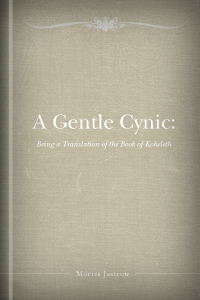
Asserting that the interpretation of Ecclesiastical authorship has changed over time, Morris Jastrow provides exegesis of the text within historical context. Jastrow examines the canonicity, traditional authorship, semantics, and hermeneutics of Ecclesiastes for comprehensive interpretation. Even as the author of the text continually reiterates the inanity of life, Morris Jastrow points to the theopneustic underpinnings within the text.
The translation furnished here is excellent, often suggestive; and the notes are illuminating where they do not involve or express the author's theory of the text and its interpolation. The book is excellently printed. . .
—The Homiletic Review
Morris Jastrow (1861–1921) graduated from the University of Pennsylvania where he became Professor of Semitic languages and worked in the school’s library. He served as an editor for the Jewish Publication Society’s Jewish Encyclopedia from 1911–1906. A prolific researcher and writer, Jastrow published over a dozen books and became president of the American Oriental Society in 1915.
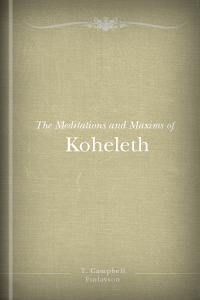
Expounding the text of Ecclesiastes, T. Campbell Finlayson provides exposition of the key themes throughout the text. Describing the book as autobiographical in nature, the author defends the divine inspiration of the text in which the author describes the futility of living for the flesh. T. Campbell Finlayson draws upon notable scholars such as Christian D. Ginsburg, Franz Delitzsch,E. H. Plumptre, and Charles H. H. Wright for further clarification on key points of discussion.
T. Campbell Finlayson (1836–1893) was the congregational minister at United Reformed Church, Cambridge and later at Rushholme, Manchester. Finlayson received an honorary Doctorate of Divinity in 1891.
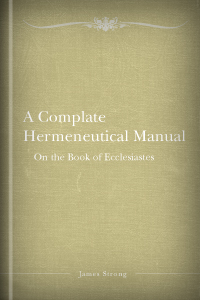
James Strong's A Complete Hermeneutical Manual on the Book of Ecclesiastes provides readers with an exegetical framework which with to look at the text. Offering clarification on authenticity, composition, historical context, and semantics, Strong walks through the text verse-by-verse while correcting the text for omission and transposition errors.
One can but rejoice in the publication of a work of this kind; and admire the courage of Dr. Strong and his devotion of a work of this kind; and admire the courage of Dr. Strong and his devotion to the interests of Christian scholarship in giving it to the world. It is the fruit of prodigious amount of labor . . .
—The Presbyterian and Reformed Review
James Strong (1822–1894) was an American Methodist biblical scholar and educator, and creator of Strong’s Concordance. Strong was born in New York City and graduated at valedictorian from Wesleyan University.
Strong became a professor of ancient languages at Troy University, and published multiple works on the harmony of the Gospels and on the Greek text of the New Testament. In 1861, he became Professor of Exegetical Theology at Drew University, where he remained for twenty-seven years.
Reviews
12 ratings


Dr. Bill Barrick
9/2/2017

M. David Johnson
3/27/2015

John L. Jefferson
9/10/2014
AeliusCicero
4/15/2014

David Leslie Bond
11/20/2013

Larry Proffitt (I
11/13/2013
Eduardo Vega
9/25/2013

Jerry Peterson
8/15/2013

RevSarge
8/5/2013